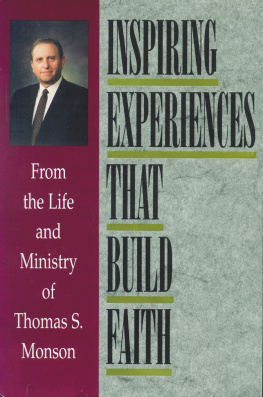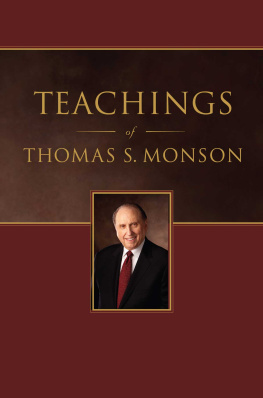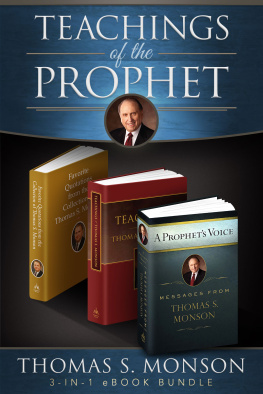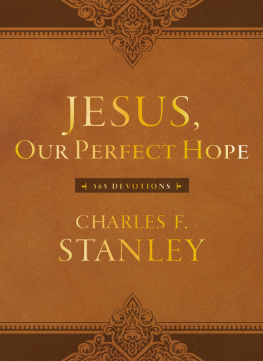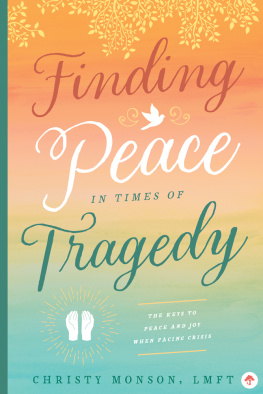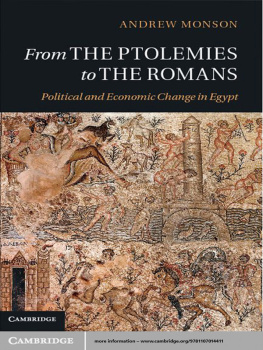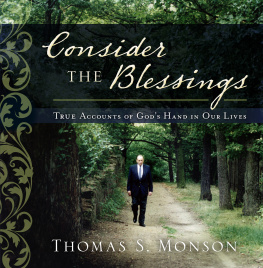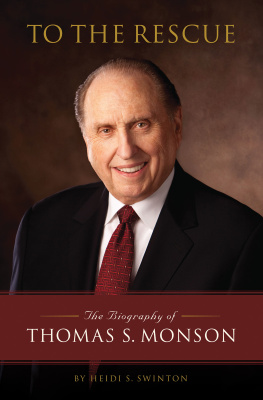Be Your Best Self
Thomas S. Monson
1979 Thomas S. Monson.
All rights reserved. No part of this book may be reproduced in any form or by any means without permission in writing from the publisher, Deseret Book Company, P.O. Box 30178, Salt Lake City Utah 30178. This work is not an official publication of The Church of Jesus Christ of Latter-day Saints. The views expressed herein are the responsibility of the author and do not necessarily represent the position of the Church or of Deseret Book. Deseret Book is a registered trademark of Deseret Book Company.
Foreword
Foreword
For some time I have had on my desk a small sign that simply says "DO IT."
As I look at this slogan, I often think of Elder Thomas S. Monson, one of my colleagues among the General Authorities, for to me he is truly a "do it" man.
I have come to know Elder Monson intimately since he was called to the Council of the Twelve in 1963, and I regard him as one of the Lord's most able servants. He has exemplified through his years of service a steady devotion to the Lord's work that is worthy of emulation.
It seems appropriate that this volume of his messages and teachings should be titled Be Your Best Self, for I believe that is the message of Elder Monson's ministry. He travels the world in behalf of the Church, and wherever he goes he is able to bring out the best in people. He is an effective leader because he has this ability to develop and cultivate the best in others.
As an Apostle of the Lord Jesus Christ, Elder Monson is filled with the pure love of Christ, and he radiates this to others. People love him because he loves them. His witness to the world is one of love and understanding.
As a community and business leader, Elder Monson has helped many others to achieve. His career before becoming a General Authority was one of personal achievement as well as motivating others to excel. His guiding hand is still felt in numerous community and business endeavors, and thus he continues to make a valuable contribution to the lives of people, members and nonmembers alike.
As a husband and father, he is also making great contributions, for his children are growing and maturing in responsible ways. He has inspired them to do their best at home, in the Church, and in their careers.
Elder Monson is a remarkable human being. The Lord has called him to great service in the Church, and he is truly giving of his best. I earnestly hope that this compilation of his wisdom and teachings will help you, the reader, to reach your maximum potential and to be your best self!
President Spencer W. Kimball
Hopeless DawnJoyful Morning
London, England, is steeped in history. Who has not heard of Trafalgar Square, Buckingham Palace, Big Ben, Westminster Abbey, or the River Thames? Of lesser renown, yet priceless in value, are the truly magnificent galleries of art situated in this city of culture.
One gray, wintry afternoon I visited the famed Tate Gallery. I marveled at the landscapes of Gainsborough, the portraits of Rembrandt, and the storm-laden clouds of Constable. Tucked away in a quiet corner of the third floor was a masterpiece that not only caught my attention, but also captured my heart. The artist, Frank Bramley, had painted a humble cottage facing a wind-swept sea. Kneeling at the side of an older woman was a grief-filled wife who mourned the loss of her seafaring husband. The spent candle at the window ledge told of her fruitless, night-long vigil. The huge gray clouds were all that remained of the tempest-torn night.
I sensed her loneliness. I felt her despair. The hauntingly vivid inscription that the artist gave to his work told the tragic story. It read: A HOPELESS DAWN.
How the young widow longed for the comfort, even the reality, of Robert Louis Stevenson's "Requiem":
Home is the sailor, home from the sea,
And the hunter, home from the hill.
For her and countless others who have loved and lost dear ones, each dawn is hopeless. Such is the experience of those who regard the grave as the end and immortality as but a dream.
The famed scientist Madame Marie Curie returned to her home the night of the funeral for her husband, Pierre Curie, who was killed in an accident in the streets of Paris, and made this entry in her diary: "They filled the grave and put sheaves of flowers on it. Everything is over. Pierre is sleeping his last sleep beneath the earth. It is the end of everything, everything, everything."
The atheist Bertrand Russell adds his testament: "No fire, no heroism, no integrity of thought and feeling can preserve an individual life beyond the grave." And Schopenhauer, the German philosopher and pessimist, was even more bitter. He wrote: "To desire immortality is to desire the eternal perpetuation of a great mistake."
In reality, every thoughtful person has asked himself this question: Does the life of man continue beyond the grave?
Death comes to all mankind. It comes to the aged as they walk on faltering feet. Its summons is heard by those who have scarcely reached midway in life's journey, and often it hushes the laughter of little children. Death is one tragic fact that no one can escape or deny.
The venerable, perfect, and upright man named Job, centuries ago, pictured death in these words: "As the waters fail from the sea, and the flood decayeth and drieth up: So man lieth down, and riseth not: till the heavens be no more, they shall not awake, nor be raised out of their sleep." (Job 14:11-12.)
But Job, like multitudes of his fellow men, rebelled at this conclusion. Turning away from the depressing spectacle of death's seeming victory, he uttered the triumphal cry: "Oh that my words were now written! oh that they were printed in a book! That they were graven with an iron pen and lead in the rock for ever! For I know that my redeemer liveth, and that he shall stand at the latter day upon the earth.... In my flesh shall I see God." (Job 19:23-26.)
And who can help but be inspired by the clarion call of the apostle Paul as he declared: "I am persuaded, that neither death, nor life, nor angels, nor principalities, nor powers, nor things present, nor things to come, Nor height, nor depth, nor any other creature, shall be able to separate us from the love of God, which is in Christ Jesus our Lord." (Romans 8:38-39.)
Perhaps no statement in scripture more dramatically reveals a divine truth than Paul's epistle to the Corinthians: "For as in Adam all die, even so in Christ shall all be made alive." (1 Corinthians 15:22.)
Frequently, death comes as an intruder. It is an enemy that suddenly appears in the midst of life's feast, putting out its lights and gaiety. Death lays its heavy hand upon those dear to us and at times leaves us baffled and wondering. In certain situations, as in great suffering and illness, death comes as an angel of mercy. But for the most part we think of it as the enemy of human happiness.
The plight of the widow, for instance, is a recurring theme throughout Holy Writ. Our hearts go out to the widow at Zarephath. Gone was her husband. Consumed was her scant supply of food. Starvation and death awaited. Then came God's prophet with the seemingly brazen command that the widow woman should feed him. Her response is particularly touching: "As the Lord thy God liveth, I have not a cake, but an handful of meal in a barrel, and a little oil in a cruse: and, behold, I am gathering two sticks, that I may go in and dress it for me and my son, that we may eat it, and die." (1 Kings 17:12.)


